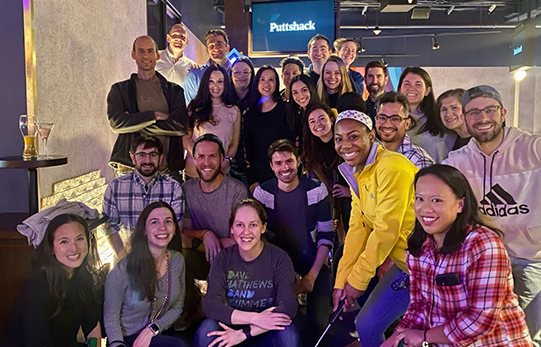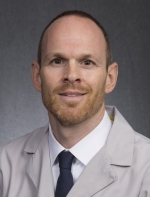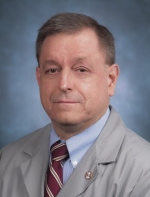Emergency Medicine Residency
About our Residency Program
Welcome to the website for the Emergency Medicine Residency program at Loyola Medicine!

We are a three year Emergency Medicine Residency program, with six residents per year, founded in 2019.
We are based at Loyola University Medical Center, just outside of the city of Chicago, in Maywood, IL, in the John L. Keeley, MD, Emergency Department.
We have built a training program that draws from decades of cumulative experience within our residency leadership.
Our mission is to train emergency medicine physicians for excellence in leadership, care and service.
Some of the highlights of our program include:
- Exposure to incredible pathology & diversity in our patient population here at LUMC, a Level One Trauma Center & Quaternary Care Center
- Extensive trauma experience, with a curriculum built through all three years of residency to give you the skills to run complex trauma resuscitations
- Experience in LUMC’s Burn ICU, one of the largest in the region
- An extremely well established EMS relationship, with our department chair acting as the Medical Director for Region Eight, which is one of the largest EMS regions in Illinois
- Longitudinal community emergency medicine experience at MacNeal Hospital, a high-volume and high-acuity emergency department that perfectly complements the experience at LUMC
- Integrated shifts at one of our immediate care centers, allowing exposure to the lower acuity patients that are increasingly harder to access for emergency medicine residents
- Bi-monthly simulation sessions in our high-fidelity, multi-room Simulation Center, with continued procedural teaching in our network of skills rooms
- A true leadership role in the mentorship and education of the students from Loyola University Chicago's Stritch School of Medicine, with both on-shift and teaching sessions built into the curriculum
- Integrated pediatric shifts both in the role of junior and senior resident
- Specialty tracks in emergency medicine (STEMEs) designed to expose you to specific areas in emergency medicine, helping you to gain exposure to these areas as you consider the next steps in your career (read more about STEMEs here)
- Weekly conference designed to move away from multiple one hour lectures, and instead focusing on simulation, small groups, team-based learning and quick-hit didactics
- A full four week orientation rotation to start your residency, with team-building exercises, skills lab, simulation, meet & greets and a two day retreat with the program's leaders
- Funded national conference attendance as both a PGY-2 & PGY-3
- A department chairman who is truly invested in the health and well-being of his residents
- A supportive family environment to help achieve everything you hope from your residency training
- A strong emphasis on teamwork in the emergency department, with clinical shifts built on a 1:1 model (one resident to one attending) for the PGY-1s, with the PGY-2.5 and PGY-3s taking ownership of their teams, pods and any junior learners in these pods
- Attending physicians with widely diverse backgrounds, including fellowship training in emergency ultrasound, sports medicine and multiple leadership roles at both Loyola University Medical Center and the College of Medicine
- 24-hour per day social work support in our emergency department
If you possess a pioneering spirit and want to be a leader in the field of emergence medicine, then we may be the program for you.
Message from the Program Director of the Emergency Medicine Residency

As you embark on the recruitment journey of the next few months, you will have many questions along the way. Some of these will be useful to you as you formulate your match list; “What kind of EM program am I looking for?”. Some of them will not be so useful; “How many inpatient floor months will I do at this program?”.
Spreadsheets will likely be created, layered with rows and columns of data that you collect on your travels – number of ICU months, number of shifts, lengths of shifts, etc. Now this is all important information, but I think when the time comes to finalize your list there are only a few key questions to consider:
- Do I like the people?
- Will this program help me obtain the job/career I want after graduation?
- Do I believe in the vision as stated by the Program Director & Department Chair?
I believe the first question is answered by your gut feeling when you meet the residents and faculty during the pre-interview (now virtual) meet & greet, and of course the interview day itself. The changes caused by the pandemic will of course make this harder, but if you stay in touch with yourself during the times, I am confident this can still be answered during virtual discussions.
The second question will be answered by the PD & the Chair, and possibly answered by data showcased to you during the interview day itself.
The third question, in my opinion, is the most important. I think every applicant needs to take a long look at themselves and think about what they want to achieve with their career; How far do they want to go? How much do they want to be pushed to get there? Who do they want to be surrounded by? What type of patients do they want to care for? There are so many questions that you need to consider answering before you accept an interview at a residency program. Knowing what our program is about, what defines it, what our vision is – all of these together will help you answer whether we may be the right residency for you.
Loyola University Medical Center is a quaternary care hospital. It is a large academic teaching hospital, complete with a great many residency & fellowship programs, and an academic affiliation with the Stritch School of Medicine. Teaching, service, learning, support and patient care is at the heart of this institution.
Key to our vision is the strength of our residents. Put simply, we want to train EM Physicians to be leaders in the field of Emergency Medicine – be it in the care they provide, the scholarly activity they pursue, the service they give, or the teaching they deliver. Leaders need to be highly trained, need to command the respect of those around them, and need to be able to teach those around them. Helping you develop these characteristics is what we will strive to do.
We have built an outstanding curriculum, with rotations built around existing relationships in our ICUs and specialty services – rotations that have been honed and crafted over many years to create the very best educational models. On top of this we are building on our relationships with many of our colleagues – trauma, anesthesia and many others to offer rotations that will give you every possible opportunity to develop the skills of patient care.
Our didactics build on the experience that our leadership brings from so many different departments and residencies. It has been built from the ground-up with one goal: to utilize the latest educational methodology to enable you to immerse yourself in Emergency Medicine education for 3 years. Simulation (which we do twice per month in Stritch’s phenomenal Simulation Center), novel & interactive didactics, Team-Based & Small-Group learning – the days of multiple hours of powerpoint-driven 1-hour lectures are far behind us.
We are also fortunate to have a faculty group rich in academic interests and scholarly pursuits. A review of their bios will show you how involved they are in the education of our LUMC residents & Stritch medical students, as well as our faculty colleagues, and how many awards they have won for their efforts. Despite not having an EM Residency until 2019, EM has been one of the most popular specialty choice for our Stritch students for several years now. Our faculty are already developed as teachers and mentors. They are ready to deliver the required education, both on and off shift, that you need to succeed. We are ready to hone your skills as teachers – something that is central to the vision of this residency. Teaching each other, teaching our faculty, our nurses, and our medical students is a required part of this residency. We will help you develop the bedside and podium skills to be truly excellent educators.
An important question for any Program Director is: “What type of resident are you looking to recruit?”, “What type are you hoping to graduate?”. The answers to these are inherently connected. The type of resident that will flourish in this program is one with strong leadership traits, a pioneering spirit, and a strong work ethic. These are the characteristics we are looking for in our future residents.
You will be the physician that takes the name of our department and showcases its capabilities to the many services and units in our hospital. You will take our name and lead patient care efforts both in and out of the hospital. Our hope is that you take it after residency and continue to push the field of Emergency Medicine forward. This is our vision. Consider your own. If you want to be a part of the history of a program, I hope our paths cross soon.
– David C. Snow, MD, MSc, FACEP, FAAEM, Program Director
Message from the Chair of the Department of Emergency Medicine

Why Loyola…..and why now?
This question was asked of me by my staff, administration, and by the site inspector from the ACGME. In fact outside of our department these two questions were asked by many when they learned we were moving forward with an EM residency. Inside the department our faculty asked the question in a little different way: “why not Loyola…..and why not now?”
The Department of Emergency Medicine – Loyola University Chicago – Stritch School of Medicine has an infrastructure and programmatic design to ensure a fantastic EM training experience. Our clinical experience, educational program and research opportunities are such to provide diversity in your formation as an EM physician.
As a primary ED to our community we see many similar cases as our community colleagues in their institutions; essential to competencies. As a secondary ED receiving patients from our various ambulatory clinics your experiences gains the added benefit of other physicians providing their insight into your clinical coordination of this patient subset. As a tertiary referral center for trauma, stroke, burns, and pediatric ICU your education and clinical experiences have the added expertise of our faculty colleagues guiding you within your own institution. And finally our quaternary ED patients who have undergone transplants, LVADs, advanced cancer treatments, complex orthopedic, spine, cardiac, and neurosurgical services will ensure your comfort and skills in addressing emergent concerns in these unique complex cases.
Clinical competency is only one aspect of your development. Other areas of ongoing development as a department include:
- Our EM Female Faculty Forum to address issues and concerns in regards to gender equality and parity.
- Opportunities within the department for fellowship development through our experiences in EMS, Toxicology, Sports Medicine, Ultrasound, and Medical Education enable you to have options for the future.
- Concern for resident life has resulted in dedicated resources for work-life balance, ongoing educational programs for your development, and physician wellness.
Our faculty have dedicated their careers to the advancement of the specialty of Emergency Medicine through the education of our students and residents. You will be joining a team where the expectation of its members is our ability to be a resource 24/7. Much like other programs in EM, you will be in a cadre of physicians always available to patients, always a resource to colleagues, and always ready for whatever our community encounters in emergent challenges.
Thank you for your interest in our program and our department. Whatever your choice, on behalf of myself and the faculty of our department, welcome to the exciting field of Emergency Medicine!
– Mark E. Cichon, D.O., FACEP/FACOEP (dist), Chairman, Department of Emergency Medicine
Featured Videos
Emergency Medicine Residency Overview
Emergency Medicine Residency Virtual Tour
